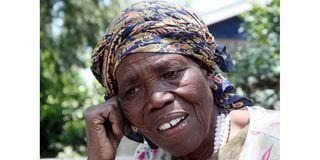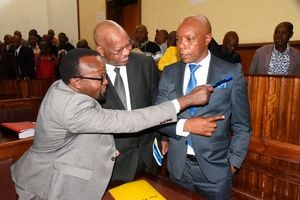Monica Wamwere, fearless mother who took Moi regime head-on

Monica Wangu Wamwere. She led mothers and wives of political detainees in protests demanding their release during the Kanu regime.
What you need to know:
- In October 1995, Monica Wamwere shouted at a judge in agitation, venting her frustrations at the State for detaining her son, Koigi Wamwere.
- When her husband died of stroke due to his sons' imprisonment, Monica refused to allow his burial, demanding that her sons be released to bury their father.
- She was one of the women who stripped naked at Freedom Corner when anti-riot police tried to disperse them; Monica will be buried today.
Justice William Tuiyot had just delivered yet another blood-curdling sentence against political activist Koigi wa Wamwere, sending him back into detention for the fourth time to serve four years and three strokes without the option to appeal.
It was in October 1995. The final rituals that follow a judgment were ongoing when, all of a sudden, an emotionally charged woman shouted at the judge in agitation, condemning him in Kikuyu language as she vented her frustrations at the State, which had once again pierced her heart.
Monica Wangu Wamwere had caught everyone off-guard, making another bold protest in the country’s history as she singlehandedly shook the Nakuru court, leaving everyone shell-shocked.
For her, tribulations and atrocities against her family had peaked and with nowhere else to turn to, for help, she went for the judge. Emotions ran high, tears flowed freely as a dejected mother went on her knees, painfully turning to her God in prayer. Her hopes, emotions and perseverance had been tested to the limit.
She is said to have been the mastermind of the ‘release political prisoners’ movement. Her firstborn son, Michael Koigi wa Wamwere, had been detained since 1990 when the clamour for multiparty democracy reached its climax. She enlisted support from Prof Wangari Maathai and Njeri Kabeberi, and traced other mothers and wives of political detainees.
Stood up to brute force
On February 28, 1992, the mothers and wives of 52 political prisoners marched to Uhuru Park’s Freedom Corner, where they camped and staged a hunger strike. However, days later on March 3, the government unleashed anti-riot police on them. The infuriated mothers stripped naked and refused to leave. The officers, who were clobbering them, abandoned the mission as the naked women screamed.
The mothers shifted their base to All Saints Cathedral, where they continued with their protests for 11 months until January 19, 1993, when they were reunited with their sons/husbands.
Reverend Timothy Njoya, who started prayers for the women at St Andrew’s, says the first three people to attend were former Assistant Minister Mirugi Kariuki’s mother, Koigi’s mother, and Raila Odinga’s wife, Ida. When he was defrocked by his church, prayers could no longer continue at St Andrew’s PCEA.
“We had to go to All Saints Cathedral because Archbishop David Gitari was tolerant. Many women got courage; we went to Uhuru Park’s Freedom Corner and I said: ‘Jesus said if somebody takes your outer gown from you, give him even the inner one.’ The women took that literally, they took their clothes off,” Rev Njoya recalls.

Monica Wangui Wamwere (right), her son Koigi wa Wamwere (centre) and Nduta wa Koigi outside the Milimani Law Courts.
The July 1990 detention of Koigi for a third time immensely affected his then aging father, who had banked his hopes on a regime change in the 1992 General Election. He prayed for a Kenneth Matiba win that would see his son released from prison. Unfortunately, the opposition failed to dislodge Kanu from power.
According to Koigi, the disappointment was too much for his father to bear. It led to him having a stroke. Nothing could make his mother believe that they would be released soon. “I’m sure she must have started feeling that for this to be won, everybody had to come forward and fight. At that point, she started feeling that she needed to join this fight if it went on like that,” Koigi recounts.
Husband’s delayed burial
Her biggest battle with the government was when Koigi was detained for the fourth time in September 1993, a few months after the release of political prisoners. For her already ailing husband, this was too much tribulation to bear; he suffered multiple strokes and died.
With her four sons in detention and her husband dead as a result of government frustrations, Monica did the unthinkable: she refused to bury her husband, demanding that her imprisoned sons be allowed to bury their father.
She felt that her husband deserved to be buried by his sons, in compliance with the Kikuyu tradition that an old man is buried by his children, with sons holding the head and carrying the casket. Monica felt that her sons had a right to be allowed to attend the burial and then be taken back to prison.

Jane Murago-Munene (left) and Monica Wangu Wamwere hold the trophy Ms Murago-Munene won for the documentary 'The Unbroken Spirit' that depicts Ms Wamwere's struggle to free her son from detention during the Moi regime.
For three-and-a-half years, she stood her ground as her husband’s body remained in the mortuary. There would be no burial without her sons participating. Pressure from the Opposition, civil society and the international community intensified and the Kanu Administration eventually budged.
“For us, it was really more than victory that we were able to do our father this justice, especially given the pain he suffered from our incarceration. The least we could give him after having suffered, as he did, was a decent burial,” Koigi says.
With four detentions – 1975, 1982, 1990 and 1993 – Koigi stands out as Kenya’s longest-serving political detainee. He has 13 years as a political prisoner under his belt, but accompanying this are permanent scars. He was eventually released on December 13, 1996, to seek urgent heart treatment following Dr Dan Gikonyo’s recommendation. He says with their incarceration came hard lessons; after all experience is the best teacher, only that it comes late.
“I discovered that parents suffer more pain for their children than the pain children suffer for parents; therefore, understand what sort of pain my mother was going through remembering all her four children locked up,” he says.
“When we came out of prison, of course, we must have wondered what we could do to compensate, but again, we felt that our freedom was the best gift that our mother could have for her suffering.”
Sunset
On October 29, Monica died after ailing for a while. Koigi announced her death on his social media page: “My mother, Monicah Wangu Wamwere, is finally resting in the Eternal. I am truly shattered by the demise of our dear mother, my heroine and saviour who also inspired my struggle for justice, second liberation, freedom and democracy, and supported our Independence to the hilt. May God rest her soul in eternal peace. Having missed our earthly heaven, we shall not miss the heavenly one.”
This was a loaded eulogy for a family bound by love, despite the pain and tribulations of yesteryears. He says the other thing they hoped for as a reward for their mother was never to lose their freedom again.
“If freedom was to be lost again, it would be a terrible blow to our mother. We’ve tried to be the best sons that we can be to our mother, we know that we are indebted to her forever. We understand that she has done more than just give birth to us.”
Rebirth
The veteran politician and former Subukia MP says as a family, every time their mother had to fight for their release was a rebirth, which makes her more than an ordinary parent. “I don’t think we have treated our mother in the best possible way, we will continue to try but, possibly, will never be able to give the perfect gift for what she did for us.”
The last statement in her obituary in the Daily Nation described her as a hero of the war for Independence. In January, the Supreme Court ordered the government to pay her Sh2.5 million damages for the torture she suffered during the Moi regime. She had sued for inhumane treatment during the 1992 protests at Freedom Corner and sought to be awarded Sh50 million. The government has yet to pay the Sh2.5 million.
The matriarch will be laid to rest today, November 10, at her Engoshura home in Nakuru County.





